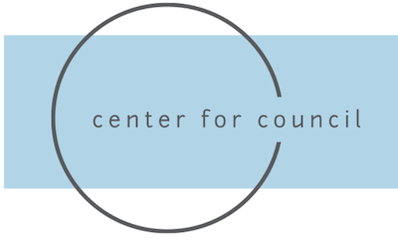 Council in prisons can transform incarcerated populations. Incarceration should prioritize opportunities for rehabilitation, so that individuals can re-enter society at the end of their sentence as individuals who contribute to the flow of life and lead a productive life. However, systemic issues in the world, and especially within the carceral system, have left the US prison system, one of the largest in the world, plagued by issues. Without proper opportunities for rehabilitation, recidivism is much more likely. The US prison system has long been criticized for its lack of effective rehabilitation programs. Many prisoners are released back into society without the necessary skills, education, and support to successfully reintegrate into the community. This can lead to a high rate of recidivism, as well as increased crime and decreased public safety. While some states have made efforts to provide rehabilitation programs to incarcerated populations, many of these programs are underfunded and understaffed, making it difficult for inmates to receive the help they need. Council is an effective and self-sustaining rehabilitation program. Jared spoke about this on the Hero Maker Podcast: “I think the transformation that some folks are able to engage in in the rehabilitative process is really striking. And I think we have seen, as a result of what we have brought into prisons, some extraordinary and inspiring transformation of individuals and their capacity to be of benefit as agents of change when they get out. And that's because they've done this work inside. And the work they've done on themselves is then translated to the work that they do in relationships, and in community.” The US prison system is plagued by a high rate of recidivism. Recent studies determined that approximately two-thirds of released prisoners reoffend within three years. This can lead to a cycle of crime, incarceration, and reoffending, which is not only costly for the prison system but also detrimental to public safety. To reduce the rate of recidivism, it is important for the prison system to provide effective rehabilitation programs that address the underlying causes of criminal behavior and provide incarcerated men and women with the skills and support they need to successfully reintegrate into society. While Center for Council’s programs offer extensive opportunities to learn and practice council inside prison, the organization’s Council Reentry Program provides a continuum of care by engaging formerly incarcerated individuals when they are released. Jared spoke about the re-entry program on the podcast: “When you're dealing with system-impaired folks who are in an environment in which they are taught to behave certain ways, and then they go into prison, many of them harden in those ways of communicating and behaving with one another. This extraordinary culture of toxic masculinity is about intimidation, being on guard, and not showing any kind of vulnerability. And then they are expected to move back into communities and cultivate successful reentry with families where there are children, and maybe there are spouses, or loved ones, and all you've known is how to kind of bully your way through something and protect yourself and not get killed inside there... Learning these new skills is so critical in all directions for cultivating a more compassionate community.” The US prison system is facing a number of pressing issues, including overcrowding, inadequate healthcare, lack of rehabilitation programs, and a high rate of recidivism. To address these problems, it is important for policymakers to invest in rehabilitation programs and re-entry programs. Only then can we hope to create a more just and effective prison system that promotes public safety, reduces crime, and supports the well-being of those in its care. We must not lose sight of how those incarcerated individuals continue to impact society while they are locked up and, particularly, as they come home and reenter society. Learn more about our prison programs here: https://www.centerforcouncil.org/incarcerated-and-system-impacted-individuals.html Listen to the rest of the podcast wherever you get your podcasts. Spotify Apple Hero Makers Website
0 Comments
Our Executive Director, Jared Seide, was featured on a recent episode of The Hero Maker Podcast. The podcast focuses on distilling experiences from career professionals in law enforcement, public safety and criminal justice into nuggets of wisdom for the future. The podcast is hosted by Jennifer Morrison, Vermont’s Commissioner of Public Safety and Andrea Shreeman, a writer/director/executive producer based in Los Angeles. Morrison and Shreeman decided to collaborate on this podcast as a way to explore and understand more about circumstances surrounding the tragic murder of one of their mutual friends.
This episode of the podcast was a deep dive into the practice of council, the POWER Program for law enforcement officers, and Center for Council’s re-entry and prison programs. Morrison, who was unfamiliar with the practice of council prior to the episode, remarked at the end of the show that she was surprised by how impactful the conversation had been and how much she wishes POWER had been available to her and her colleagues in law enforcement 30 years ago. Jared outlined the skills developed in Center for Council’s programs, including ways to increase self-awareness and develop tools for self-regulation, as well as improve capacity to interpret and understand social cues and situational awareness, which are things we all use to track and maintain our safety. Police officers are particularly concerned with this and are also faced with the challenge of cultivating relationships with the communities they serve. Jared noted that social intelligence, in particular, is: "...an important area of skills to build that are often neglected in law enforcement training. How is it that we ask officers to step into communities where they feel overwhelmed and in a high stress state, knowing they are not resourced to be able to navigate this very complicated interaction of: ‘Who you are to me? A friend or foe? An ally or somebody that is going to give me a hard time?’” Morrison agreed, remembering how law enforcement was never properly resourced 30 to 35 years ago, when she began her career. Center for Council’s Peace Officer Wellness, Empathy & Resilience (POWER) Training Program provides a robust curriculum of activities and lessons that develop self-awareness and self-regulation skills and utilize council, an age-old practice that involves bringing people together in a circle to bear witness and share authentically. Council huddles become a sustainable peer-to-peer resource for officer wellness. Find out more about POWER, and hear LAPD officers reflecting on their powerful recent experiences in the course at: c4c.link/POWER. Listen to the rest of the podcast wherever you get your podcasts. Spotify Apple Hero Makers Website  Council Training Level One: Introduction to the Way of Council is an intense 16-hour training course that offers participants the chance to learn about and engage with the council process. This course, taught by two certified council trainers, is intended to increase participants' understanding, competence and capacity to practice and offer council in their personal and professional lives, as well as in their communities and workplaces. The course is made available by Center for Council to the general public all year long as well as to individual companies, organizations, and governmental bodies that wish to incorporate the practice of council into their everyday operations in order to enhance organizational wellbeing. The fact that CT1 offers 15 CE credits makes it a worthwhile opportunity for mental health professionals to earn the credits needed for licensure. CT1 offers participants an opportunity to thoroughly examine the development, foundations, and intricacies of the forms and modalities of council. The course also provides participants with a foundation in the fundamental methodology and practice of council and examines more extensive applicability to a range of contexts, including schools, boardrooms, prisons, communities, as well as more private contexts like families and couples. The workshops draw a wide range of professionals, including social service providers, therapists, artists, and educators. CT1 workshops are frequently offered in Southern California and are available to be provided throughout the country and globally, in collaboration with regional businesses, institutions of higher learning, and community groups. If you're curious about council practice and want to learn more about this evidence-based practice to support personal, organizational and community wellness, visit centerforcouncil.org. Sign up for our next CT1 here: https://www.centerforcouncil.org/in-person-council-workshops.html  Since ancient times, people have used storytelling as a practice to connect, heal, and foster understanding. Sharing one's story can have a dramatic effect on both the speaker and the listener, as well as promote healing by increasing self-awareness and empathetic capacity. Council is about telling our story and Hearing other people's story. Storytelling enables us to process experiences and emotions in a secure and encouraging setting. This can make the practice of council healing and restorative. When we share the story of our experience, we have the chance to drop in, explore and make sense of it in a way that may not have been feasible in the past. This often leads to a deeper understanding of oneself and one’s experiences, resulting in increased self-awareness and self-acceptance. Storytelling can be a potent tool for establishing connections amongst people. We give others a deeper and more genuine understanding of who we are when we share our stories authentically. The act of offering regard and open-hearted listening to another’s story encourages this sharing and enables us to bear witness to the experience of others on a deeper level than analytical or judgmental listening, which is often our default outside of council. In these ways, the practice of council increases understanding and connection amongst people, as well as a sense of community and belonging. Storytelling has the potential to be a strong force for change. By telling our stories and hearing others, we can bring attention to pressing problems, which can motivate others to take action. An example of this is the #MeToo campaign, which raised awareness of the pervasive issue of sexual assault and harassment, was initiated by a single person sharing her experience on social media and a lot of people listening in. This one action sparked a worldwide movement of people telling their own stories and attempting to make the world a safer and more just place. Unlike debate or persuasion, sharing our narrative offers an opportunity to connect, heal, and instigate change. We may better understand ourselves, develop closer bonds with others, and contribute to the creation of a better world by telling our stories. Our stories have the potential to be a potent means of healing and personal development. Join our next Social Connection Circle here: https://www.centerforcouncil.org/social-connection-councils.html Or come to a Council Training Workshop: https://www.centerforcouncil.org/in-person-council-workshops.html |
Categories
All
Archives
March 2024
|
|
|
About |
|


 RSS Feed
RSS Feed
